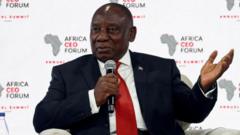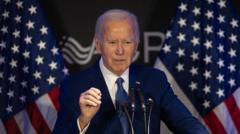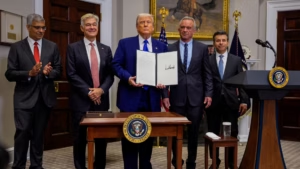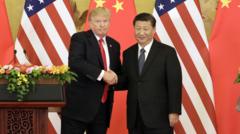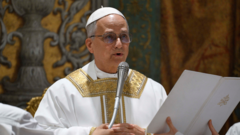The connection between Donald Trump and his Christian supporters runs deep, as many evangelicals view him as a modern-day savior. Despite declining religious affiliation among Americans, Trump's promises resonate with faith-driven voters. Yet, dissenting voices among Christians highlight a divide in moral interpretation tied to their faith.
Faith in Trump: The Prominent Christian Support That Shapes His Campaign

Faith in Trump: The Prominent Christian Support That Shapes His Campaign
As the 2024 presidential race heats up, Donald Trump continues to attract a fervent base of Christian supporters who believe he is divinely chosen to lead the nation.
Standing on a stage adorned with American flags in a Florida convention center, Donald Trump proclaimed in his victory speech, "Many people have told me that God spared my life for a reason, and that reason was to save our country." This sentiment is a recurring theme among his supporters, who believe he is a divinely appointed leader destined to guide America back to greatness. The fervent backing from a section of American Christians is particularly evident in light of the rise he experienced during the recent election cycle.
Long before a failed assassination attempt on him on July 13 in Butler, Pennsylvania, millions of Americans were already feeling spiritually compelled to support Trump, viewing him in an apocalyptic light akin to a Biblical figure. On Christian television show FlashPoint, evangelist Hank Kunneman claimed there was "an anointing" on Trump that evoked fear within his enemies, while actor Jim Caviezel humorously referred to him as "the new Moses.” This idyllic portrayal raises questions about why many Christians, despite concerns about Trump’s personal faith, see him as a messenger from God.
Among Trump’s most notable supporters is Reverend Franklin Graham, a prominent evangelist and son of the late Billy Graham, who staunchly believes that Trump is on a divine mission. Graham recalls how an assassination attempt almost altered the course of Trump's life but asserts that divine intervention saved him. While concerns about Trump’s conduct surface, Graham's response echoes the Biblical sentiment of universal sinfulness: "All of us have sinned."
For many, Trump’s appointment of anti-abortion judges and his commitment to religious freedom resonates deeply, reflecting his alignment with evangelical priorities. Similarly, the support Trump receives from influential figures like Mike Huckabee signals that faith could play a role in shaping U.S. foreign policy, especially concerning Israel, which many evangelicals fiercely support due to its Biblical implications.
On the flip side, the overall trend shows a decline in church attendance in the United States; approximately 64% of American adults identified as Christians a few years ago, down from 90% in the early '90s. Public Religion Research Institute (PRRI) founder Robert Jones observes that while supporting Trump, the evangelicals may not necessarily view him as a devout Christian, but rather as someone who can restore power to their churches amidst declining affiliation.
Differentiating views among Christians are notable. Reverend Monte Norwood of Bible Ways Ministries has voiced stark opposition to Trump's behavior, asserting that he has "demeaned and debased" various communities. Norwood advocates for activism aimed at voter engagement and support, reflecting a growing divide among Christians regarding moral leadership.
Historical voting patterns reveal that white Christian demographics tend to favor the Republican Party, while non-white and secular groups tend to gravitate toward Democratic values. PRRI research shows stark differences in support for Trump among various religious and racial groups, highlighting the complexity of faith-based political affiliations.
As the election approaches, while many see Trump as a beacon of a Christian revival, dissenters within the faith community remain skeptical of his leadership. With shifting demographics, ongoing debates around inclusivity and morality within Christian values could shape the future of faith in American politics. Franklin Graham asserts that Trump's election doesn’t immediately translate to an increase in church attendance but may protect religious freedoms from impending progressive agendas. Observers will be paying close attention to how the socio-political landscape unfolds for Americans of faith as the 2024 election nears.

